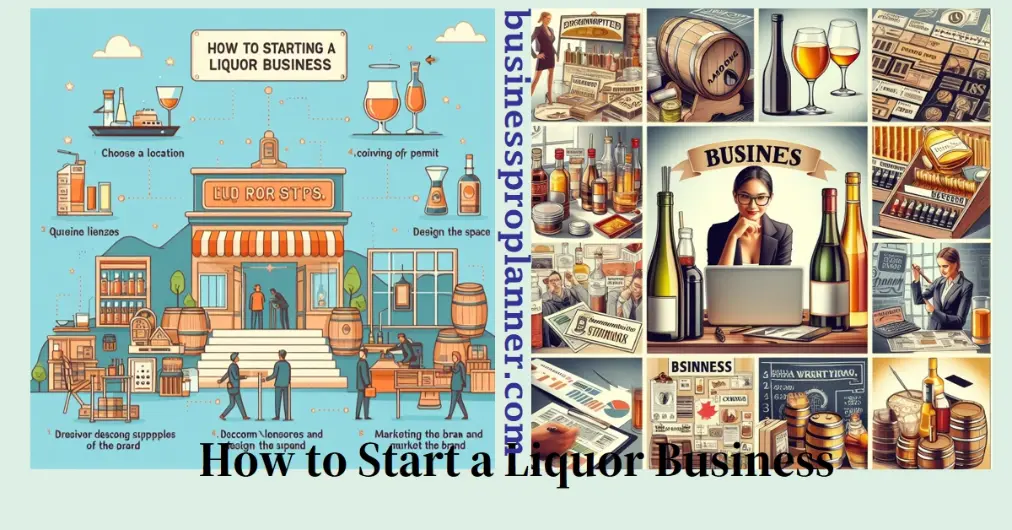In the realm of business, few ventures rival the allure of the liquor industry. Wondering how to start your own liquor business? This guide is your roadmap, covering industry trends to legal requirements for a successful launch. Operating a liquor store presents lucrative opportunities, demanding meticulous planning. The alcohol beverage sector thrives, driven by evolving consumer preferences.
Craft brews, small-batch spirits, and niche wines offer strategic openings for entrepreneurs. Launching now taps into the growing demand for unique libations. Despite economic fluctuations, liquor stores remain resilient, proving recession-proof.
The premiumization trend underscores consumers’ readiness to invest in quality. Amidst market saturation, specialty liquor shops thrive by offering personalized service and distinctive products. This article will provide an overview of what is involved in successfully starting a new liquor store business.
Key Takeaways
- Conduct extensive market research and create a detailed business plan.
- Obtain all required licenses, permits, and insurance. A liquor license is essential.
- Find a suitable retail location with ample parking and visibility.
- Stock a wide variety of popular and niche liquor brands and varieties.
- Comply with liquor laws and regulations in your state and municipality.
- Promote your store’s grand opening and implement marketing strategies.
- Hire knowledgeable staff to provide excellent customer service.
- Institute inventory systems to control costs and track sales data.
Understanding about Liquor Business
Liquor Industry Trends
The liquor industry is experiencing several shifts that aspiring business owners should note:
- Surging demand for premium spirits – consumers trading up to top-shelf liquor brands
- Craft beer exploding in popularity – driving the growth of local breweries
- Canned cocktails and hard seltzers compete with beer and wine
- Increase in online liquor sales – delivery apps and e-commerce sites
- Customers seeking more education, guidance, and unique offerings
All these ongoing trends point to a healthy outlook for the liquor industry and growing opportunities for new entrants.
Industry Size and Growth
- The United States liquor store industry generates over $58 billion in annual sales
- Industry revenue is expected to grow at an annualized rate of 2.2% over the next five years
- There are around 43,500 liquor stores in the United States
- Convenience stores account for over 20% of liquor sales
Liquor retailing has a relatively low barrier to entry compared to other industries, creating opportunities for new independent stores.
Advantages and Disadvantages of the Liquor Business
Potential Advantages
- Steady customer demand and recurring revenues
- Higher profit margins than grocery/convenience stores
- Specialty stores can differentiate with quality service
- Opportunity to capitalize on craft beer/spirits trends
- Inventory can be converted to cash quickly
Potential Disadvantages
- Intensive regulations and licensing requirements
- Staff oversight essential to limit theft and errors
- Small operations vulnerable to low-cost big-box competition
- Changing consumer preferences requires constant adaptation
- Physical stores have higher overhead costs than online
By understanding the intricacies of the liquor industry, an entrepreneur can make smart decisions to maximize their chances of sustaining a prosperous liquor business.
Essential Steps How to Start a Successful Liquor Brand Business

Crafting a Business Plan
The first critical step is to research your local market and create a business plan. This will help you determine startup costs, target demographics, and strategies for success.
- Analyze Market Demand: Examine population statistics and alcohol consumption patterns in your area. Survey residents to gauge interest in a new liquor store. Assess the purchasing habits of nearby potential customers.
- Assess the Competition: Identify existing liquor stores, wine and spirit shops, and grocery/convenience stores selling alcohol. What products and services do they offer? What are their strengths and weaknesses? How can you differentiate your business?
- Create a Financial Plan: Estimate startup costs like licensing, inventory, renovations, and staffing. Forecast operational expenses like rent, salaries, and insurance. Determine profit margins for liquor brands you’ll carry. Project annual revenues and set financial goals.
- Choose a Business Structure: Most liquor stores operate as sole proprietorships, partnerships, or limited liability companies. Each structure has different legal and tax implications. Consult an attorney to choose the best one for your business.
Obtaining Liquor Licenses and Permits
Alcohol sales and distribution are strictly regulated, so you must obtain all required licenses and permits first.
- Liquor License: Each state has its regulations regarding liquor licensing. Some places limit the number of liquor licenses available. The process can take months.
- Sales Tax License: Required to collect sales tax from customers and remit it to the state.
- Health Permits: Check if your local health department requires food handler permits.
- Federal Licensing: You will need a Federal Tax ID number and special licensing to sell alcohol across state lines.
Finding the Right Location
Choosing the right location for your liquor store is key to attracting customers and optimizing sales.
- High-foot traffic areas like shopping centers or downtown districts
- Easy road access and ample parking spaces
- Visible storefront and prominent signage
- Sufficient space for shelving displays and inventory storage
- Compliance with local zoning regulations
- Consider buying an existing liquor store with a grandfathered license
Designing the Store Layout
Create an efficient store layout that makes it easy for customers to find products and check out.
- Entryway: Baskets, coolers with chilled beer/seltzers, impulse purchase displays
- Wine Section: Organize by varietal and region, highlight top sellers
- Spirits Displays: Feature premium brands at eye level, best-selling vodkas, rums, etc.
- Refrigerated Cases: High-volume beers, some wines, cold liquor cocktails
- Counter: Staffed registers for ID checks and purchase processing
Building Your Liquor Inventory
Carefully select your inventory of beer, wine, and spirits to appeal to local preferences.
- Find a trustworthy liquor distributor for wholesale pricing
- Stock popular national brands of liquor as well as local/craft selections
- Include a variety of beer styles – pilsners, IPAs, lagers, stouts
- Offer wines at various price points – build relationships with wineries
- Do product tastings so staff can guide customers to new favorites
Hiring and Training Staff
Knowledgeable staff with excellent customer service skills are vital for liquor stores.
- Hire friendly employees with sales experience and product knowledge
- Check references thoroughly as staff will manage cash and inventory
- Get alcohol handler certifications – many states require it
- Train staff on store policies, liquor regulations, ID checking, and using POS system
Marketing Your New Liquor Store
Use marketing strategies to promote your grand opening and attract customers.
- Grand Opening Event: Live music, free food, sales promotions
- Loyalty Program: Rewards, specials for members
- Social Media: Instagram for products/tastings, Facebook specials
- Local Partnerships: Donate to events, sponsor sports teams
- In-Store Tastings/Classes: Engage customers, promote suppliers
Adhering to Liquor Laws and Regulations
Follow all laws and safety requirements around selling and serving alcohol.
- Check Customer IDs – use scanners, monitor staff compliance
- Don’t serve underage or intoxicated customers
- Display Alcohol Responsibly – no ads targeting minors
- Comply with limits on hours/days alcohol can be sold
- Maintain security systems and theft prevention measures
- Obtain liability insurance to safeguard against risks
Instituting Inventory Management and POS System
Use systems to track inventory costs, sales data, revenues, and customer purchasing patterns.
- POS System – track sales history, inventory levels, consumer data
- Inventory Software – organize backstock, streamline ordering
- ID Scanner – quickly verify ages, reduce liability risks
- Security Cameras – monitor premises, prevent shoplifting
Steps for Ongoing Success
Once up and running, focus on building profitability and a loyal customer base.
- Survey customers for feedback to improve service
- Introduce new product samples and brands
- Analyze sales data to optimize inventory and pricing
- Watch for emerging liquor trends to stay competitive
- Maintain compliance as laws and regulations evolve
- Consider expanding into additional locations once established

Conclusion
Launching a successful liquor business requires immense preparation and strategic planning. But for determined entrepreneurs who perform due diligence, obtain proper licensing, and open stores offering personalized service and curated alcohol selections. The hard work can pay off in the form of a sustainable, profitable enterprise.
Take time to celebrate major milestones like securing financing, opening your doors, and becoming profitable. But also stay focused on the future, adapting to industry shifts and implementing new ways to add value for your loyal customers.
Remember that compliance is an ongoing effort as regulations evolve. Maintain standards while seeking new opportunities for growth and long-term viability. With business savvy, passion, and an ability to pivot, liquor retail entrepreneurs can thrive in this competitive yet rewarding industry.
The lucrative liquor business provides avenues for bold visionaries to introduce innovations. Trust your intuition, leverage available resources, and keep your customers at the heart of every decision. If you lay the proper groundwork and execute with agility, your drinks business can flourish for years to come. The potential rewards are worth toasting!
